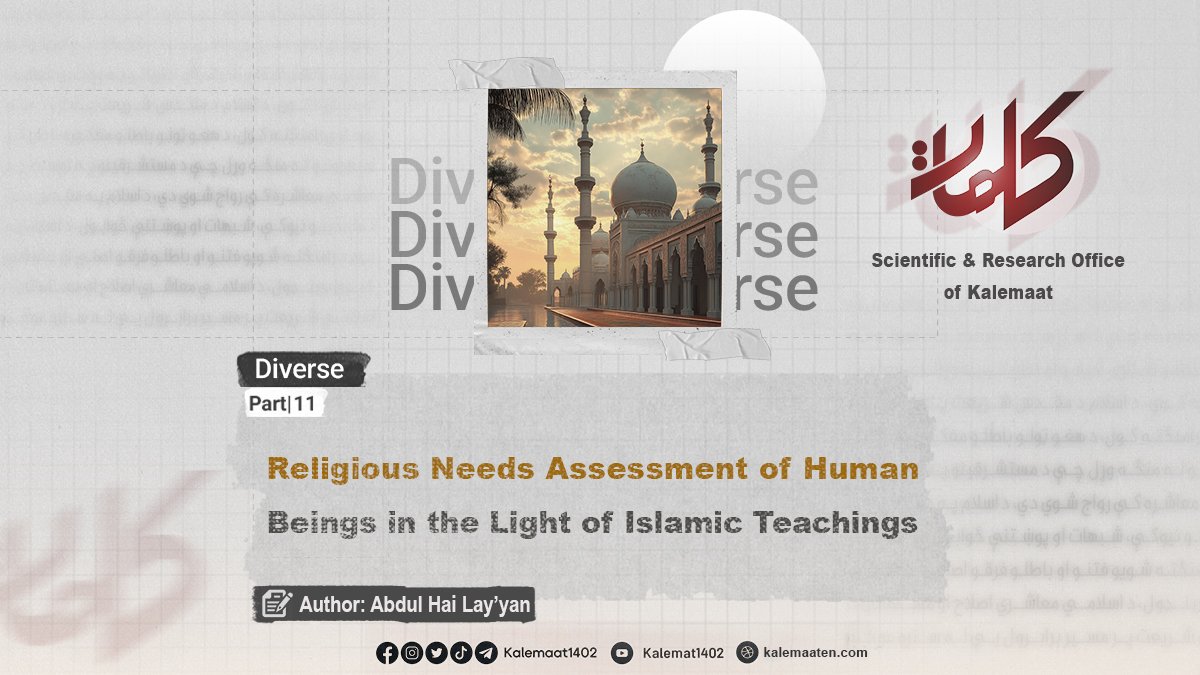Author: Abdul Hai Lay'yan
Religious Needs Assessment of Human Beings in the Light of Islamic Teachings (Part eleven)
The Three Pillars of Worship
It is worth noting that the pillars of this act of worship are love, fear, and hope toward the One being worshiped.
Allah has combined these three elements in the Noble Qur’an, where He says: “أُولَئِكَ الَّذِينَ يَدْعُونَ يَبْتَغُونَ إِلَى رَبِّهِمُ الْوَسِيلَةَ أَيُّهُمْ أَقْرَبُ وَيَرْجُونَ رَحْمَتَهُ وَيَخَافُونَ عَذَابَهُ إِنَّ عَذَابَ رَبِّكَ كَانَ مَحْذُورًا.” Translation: “Those whom they invoke are themselves seeking the means of access to their Lord—striving as to which of them will be nearest—and they hope for His mercy and fear His punishment. Indeed, the punishment of your Lord is something to be cautious of.” (Al-Isra: 57)
Seeking a means of nearness to Allah refers to love, which motivates one to draw close to Him. Then, Allah mentions hope and fear. This represents the true way of worship practiced by the sincere servants and friends of Allah.
A person who worships Allah based on love alone may fall into making the unlawful things permissible, saying, “Sin does not harm the one who loves Allah.” This is undoubtedly a false statement that contradicts Islam, for sins inherently harm the sinner—just as poison harms the body. What leads to such deviation is separating love from fear.
When love is accompanied by fear, it keeps a person on the right path and brings him back when he strays. Fear is like a whip that directs a mount to stay on the road, while hope is like a gentle driver who makes the journey pleasant with his melodious voice. Love, meanwhile, is the rein and guide that pulls the mount forward.
If the mount has no whip or sticks to correct it when it swerves, it will surely lose its way. Nothing guards the boundaries and prohibitions of Allah better than fear, hope, and love for Him. The pious draw closer to Allah through these three. When the heart is devoid of them, it becomes corrupt and hopeless; and when one of them weakens, faith diminishes in proportion.
Worship is the complete and perfect combination of these three elements. Perfection of one pillar without the other two does not constitute true worship. Hence, worship belongs solely to Allah. Though its benefit returns to the servant and Allah is free of need, it is directed to Him because He alone deserves it, loves it, and is pleased by it.
Servitude to the Creator is the highest rank a human can attain. The perfection of mankind and his ascent to the loftiest spiritual stations depend on realizing this very purpose for which he was created. Through this, he is freed from servitude to other creatures or to his own desires—for this is the greatest of all purposes. One whose existence is tied to this goal becomes noble and elevated. Conversely, one who believes his purpose is merely to satisfy bodily urges and lusts is indeed base and despicable.
Allah has likened such people to cattle: “وَالَّذِينَ كَفَرُوا يَتَمَتَّعُونَ وَيَأْكُلُونَ كَمَا تَأْكُلُ الْأَنْعَامُ وَالنَّارُ مَثْوًى لَهُمْ.” Translation: “Those who disbelieve enjoy themselves and eat as cattle eat, but the Fire will be their abode.” (Muhammad: 12)
Such people possess neither noble human qualities nor higher virtues—they have fallen below them. Like beasts, they are devoid of intellect and dignity, their only goal being worldly pleasure and sensual gratification. Thus, all their inner and outer movements revolve around this aim, never reaching toward what brings true happiness and success.
Because of the lofty status of worship, Allah described His Prophet (PBUH) as a servant (‘abd) in the most honorable of his states:
-
In the event of the Night Journey (Mi‘raj):
“سُبْحَانَ الَّذِي أَسْرَى بِعَبْدِهِ لَيْلًا” Translation: “Glory be to Him Who took His servant by night…” (Al-Isra: 1)
-
During revelation:
“فَأَوْحَى إِلَى عَبْدِهِ مَا أَوْحَى” Translation: “Then He revealed to His servant what He revealed.” (An-Najm: 10)
-
In the act of calling (to monotheism):
“وَأَنَّهُ لَمَّا قَامَ عَبْدُ اللَّهِ يَدْعُوهُ كَادُوا يَكُونُونَ عَلَيْهِ لِبَدًا” Translation: “When the servant of Allah stood up to call upon Him, they almost crowded upon him.” (Al-Jinn: 19)
-
In the challenge to the disbelievers (the Qur’anic challenge):
“وَإِن كُنتُمْ فِي رَيْبٍ مِّمَّا نَزَّلْنَا عَلَى عَبْدِنَا فَأْتُوا بِسُورَةٍ مِّن مِّثْلِهِ” Translation: “And if you are in doubt about what We have revealed to Our servant, then produce a chapter like it.” (Al-Baqarah: 23)
In conclusion, the entire religion (dīn) falls within the meaning of worship (‘ibādah) and servitude (‘ubūdiyyah), for the essence of religion is humility and submission. The Arabs would say: “I have made him dīn (subject),” meaning “I have humbled him.” Likewise, to “dīn oneself to Allah” means to worship, obey, and submit to Him. Therefore, the religion of Allah is none other than worship, obedience, and submission to Him.
continues…
Previous Part/ Next Part
References:
[1]. Al-Isra: 57.
[2]. Muhammad ibn Abi Bakr ibn Ayyub ibn Sa‘d Shams al-Din, Ibn al-Qayyim al-Jawziyyah, Bada’i‘ al-Fawa’id, Vol. 3, p. 523.
[3]. Muhammad: 12.
[4]. ‘Abd al-Rahman ibn Nasir al-Sa‘di, Tayseer al-Kareem al-Rahman fi Tafseer Kalaam al-Mannaan, p. 786.
[5]. Al-Isra: 1.
[6]. Al-Najm: 10.
[7]. Al-Jinn: 19.
[8]. Al-Baqarah: 23.
[9]. Ahmad ibn ‘Abd al-Haleem, Shaykh al-Islam Taqi al-Din, Al-‘Uboodiyyah, p. 48.



